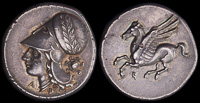Corinthia
Aletes, first Bacchiad king of Corinth, takes control of the city from the Sisyphids.
Telestes, the last Bacchiad king of Corinth, is killed.
A channel that separates the island from the mainland is constructed by Corinthian settlers at Leukas to aid in navigation.
Death of the tyrant Kypselos in Corinth. He is succeeded by his son Periander.
Anaktorion founded by settlers from Corinth.
Death of the tyrant Periander of Corinth, who had built the city into a major trading center. After Periander supposedly defiles the corpse of his wife, his son Lykophron departs for Korkyra. When Periander offers him the rule of Corinth, the inhabitants of Korkyra kill Lykophron rather than let him depart. Periander dies of grief.
Death of Psammetichos, the last of the Kypselid tyrants of Corinth.
The Isthmian Games are established in Corinth.
Construction of the Temple of Apollo at Corinth.
The Battle of Thermopylae. Soldiers from Sparta, Mantinea, Tegea, Orchomenos (Arkadia), Corinth, Phlious, Thespiai, Phokis, Opuntian Lokris, and other cities are overrun by the Persians at a huge cost.
August 7
August 27
Corinth obtains control over Anaktorion through fraud after the city had been joinly occupied by Corinth and Korkyra.
429 BCE
The Spartans under Agesilaos II attack and Persia. Artaxerxes II retaliates by bribing Corinth, Thebes, and Athens to make war on Sparta.
July
Sparta and their allies, including Sikyon and Tegea, defeat Athens and their allies at the Battle of Nemea. On Athens side are Thebes, Lokris Opuntii, and Corinth. With Sparta are Halieis, Sikyon, Epidauros, Troizen, and Hermione. Phlious remains neutral. Pellene fights on the side of Sparta against Thespiai.
Pharnabazos travels to Corinth and provides them with funds to rebuild their fleet, then he provides Athens the funds to rebuild their long walls.
Polyperchon controls much of the Peloponnese, including Corinth and Sikyon.
Demetrios Poliorketes re-establishes the Corinthian League while at Athens.
Demetrios Poliorketes seizes Epidauros, Sikyon, Corinth, Bura, Argos, and Orchomenos.
Antigonos II regains control over Corinth.
Aratos of Sikyon takes Acrocorinth. The inhabitants of Corinth rise up against Antigonos II.
Romans are allowed to take part in the Isthmian Games of Corinth.
Aratos of Sikyon takes the Acrocorinth and frees Argos. Xenon steps down in Hermione.
197 BCE
Julius Caesar refounds Corinth as a Roman colony, Colonia Laus Iulia Corinthiensis. Dyme is also refounded as a colony.
The Apostle Paul visits Corinth and stays for 18 months during his second missionary journey, preaching and establishing a Christian community. He later writes at least two letters (First and Second Corinthians) to the community, which become part of the New Testament.
Corinth suffers a major earthquake that causes extensive damage to the city.
April 2
The author of this page arrives at Corinth and photographs it.
April 3
The author of this page tours Corinth and Acrocorinth, then heads to Delphi.
